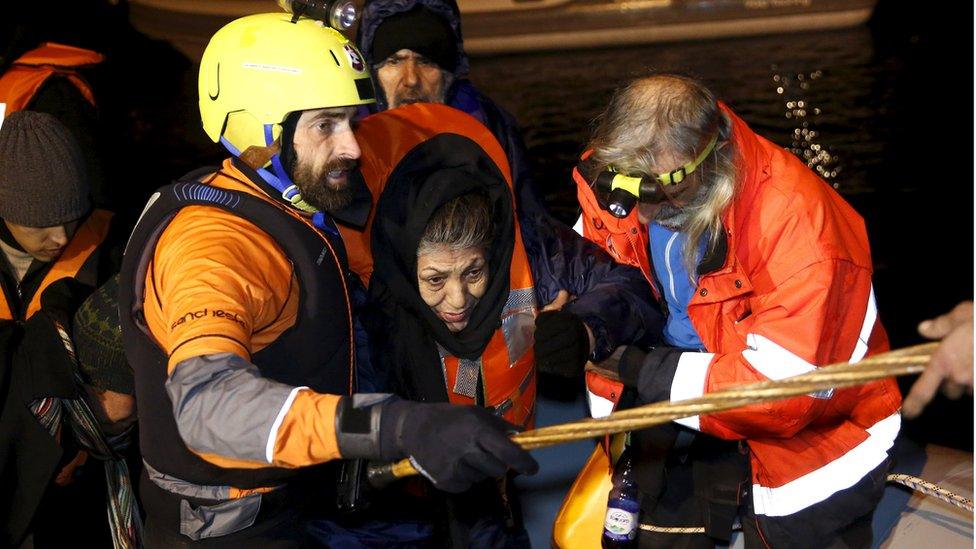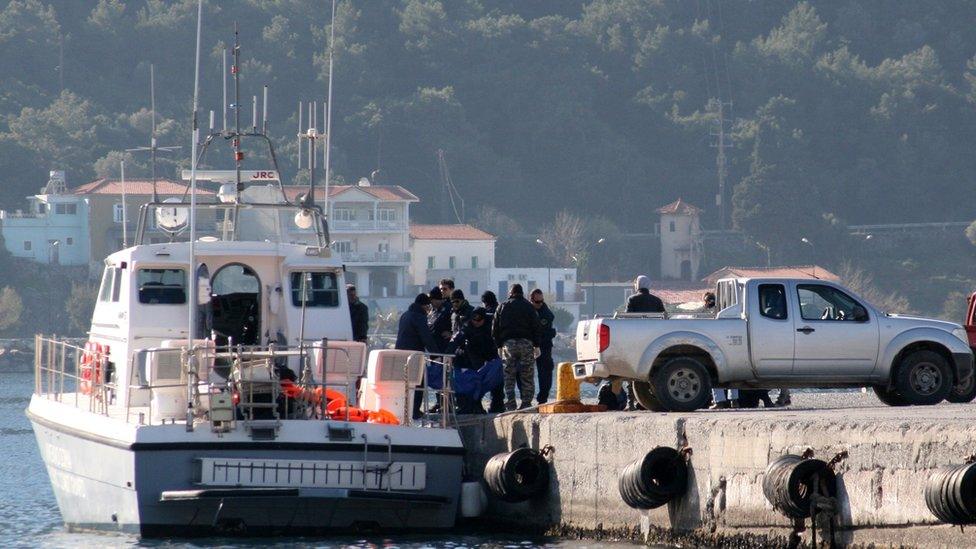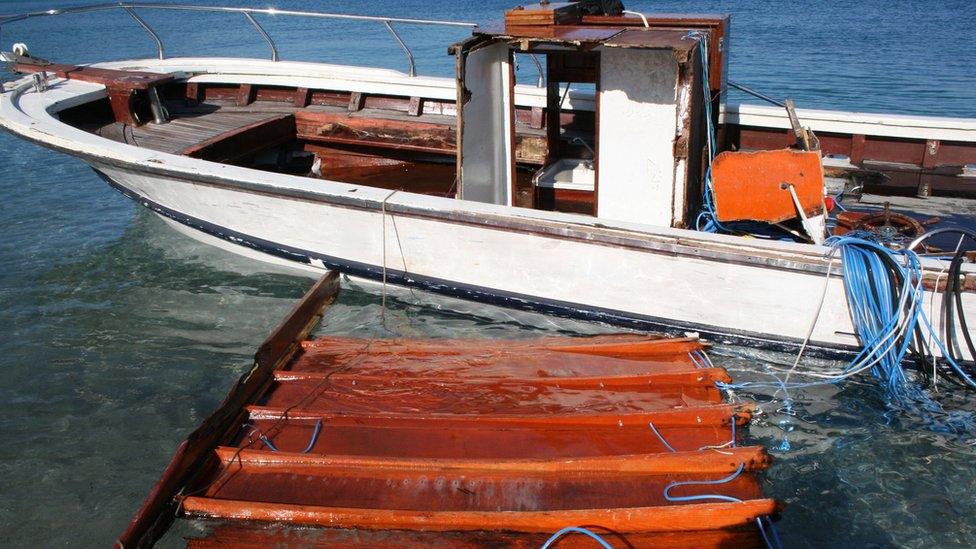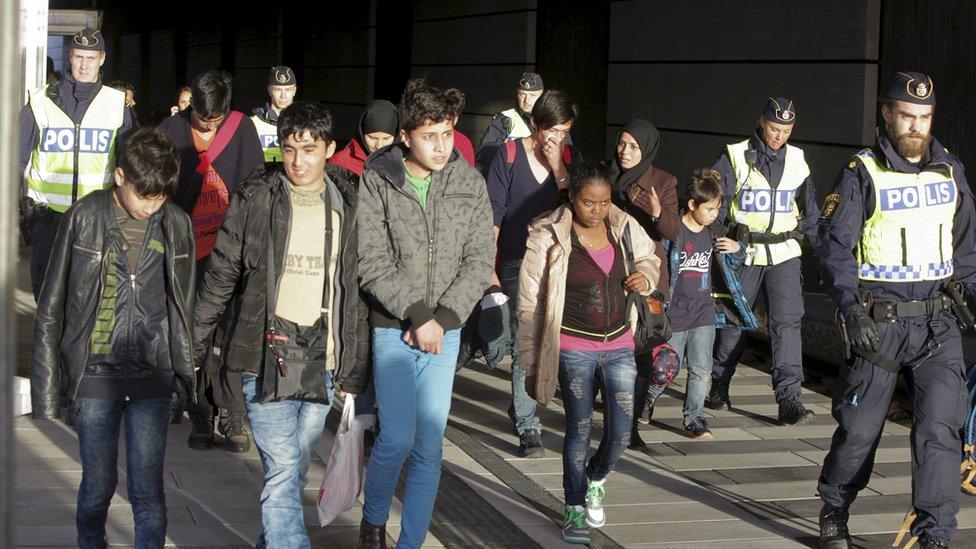Migrant crisis: Dutch plan for return ferry to Turkey
- Published

Two hundred migrants have drowned in the Aegean this month and more deaths were reported on Thursday
Migrants and refugees arriving on the Greek islands would immediately be sent back by ferry to Turkey, under a Dutch plan aimed at solving the crisis.
Under the proposal, Labour party leader Diederik Samsom says that in return the EU could offer to take in up to 250,000 refugees a year currently in Turkey.
More than 850,000 people arrived on the Greek islands from Turkey last year.
The plan would need to be in place by spring, before the next surge in numbers is expected, he says.
Already some 46,000 have reached Greece in January. Most arrivals are fleeing conflict in Syria, Iraq and Afghanistan.
The European Union said it was unaware of the proposal, adding that it did not "push back" asylum seekers.
Two hundred people have drowned trying to get to Greece this month and more deaths were reported on Thursday.
Twenty-four bodies, including those of 10 children, were recovered by the Greek coastguard after a boat sank off Samos, officials said.

Bodies of those who drowned were brought to the harbour at Samos

The boat used by the victims to cross from Turkey to Samos was towed into port during the morning
On Wednesday, a draft European Commission report said Greece had "seriously neglected" its obligations to control the external frontier of Europe's passport-free Schengen zone. But Greek government spokeswoman Olga Gerovasili accused the Commission of "blame games".
The Dutch proposal "to force a solution" to the migrant crisis came as the Swedish authorities said as many as 80,000 people who arrived there last year could fail in their requests for asylum and face deportation.
Greece feels it is being blamed for a Europe-wide problem, reports James Reynolds
Interior Minister Anders Ygeman said charter aircraft would be used to deport the migrants but it would take several years.
Mikael Ribbenvik, head of operations at the Swedish Migration Agency, told the BBC that assessing all the asylum applications would be "an enormous feat to accomplish" and would require more resources from the government.
"A lot of people leave voluntarily and a lot of people abscond. And then we have a few people staying on who are impossible to remove because of identification purposes," he said.
'Realistic chance'
The Dutch plan, said to have the support of Prime Minister Mark Rutte, would depend on Turkey having the status of a safe country for refugees, which would mean that they could be sent back from Greece under UN charters. Only one EU country currently considers Turkey safe.
Diederik Samsom, whose Labour party is in coalition with Mr Rutte's liberal VVD, told Dutch newspaper De Volkskrant there was a "realistic chance" that a change in EU policy could be ready by March or April.
The Dutch government holds the EU presidency and Mr Samsom has apparently been working on the plan with Prime Minister Rutte since last month.
Mr Rutte said last week that the EU had six to eight weeks to reach agreement on how to tackle immigration, and if it was unable to, "we have to think about a plan B".

Sweden had the highest per capita number of asylum applications of any European country in 2015
Mr Samsom said Turkey would be willing to accept the return of migrants and refugees, as long as the EU took in 150,000 to 250,000 per year. The Turkish prime minister is due to visit the Netherlands next month.
However, in an initial response to Mr Samsom's comments, a European Commission spokeswoman told the BBC that anyone requesting asylum on arrival in the EU would never be turned away.
Amnesty International condemned the idea as "morally bankrupt".
The Dutch Labour leader said there had to be an end to the tide of makeshift boats arriving on the Greek coast. "The Aegean Sea has become a mass grave, 3,700 people died there last year," he told Dutch radio.
Several EU states reject the idea of quotas for refugees, but Mr Samsom said as long as a group of 10 countries agreed to it, it could work. Those member states unwilling to take in refugees would help shoulder the cost of care.
He said discussions had taken place with Germany, Sweden and Austria and named France, Italy, Spain and Portugal as countries that might also be prepared to take in refugees.
Swedish controls
Some 163,000 migrants applied for asylum in Sweden in 2015, the highest per capita number in Europe.
The numbers have fallen significantly since Sweden imposed tighter border controls this year.
Of the approximately 58,800 asylum claims processed in Sweden last year, 55% were accepted.
Of those whose asylum requests were expected to fail, Mr Ygeman was quoted in Swedish media as saying: "We are talking about 60,000 people but the number could climb to 80,000."
But he later tweeted to say he had not taken a position on how many migrants had grounds for asylum, it being a matter for the authorities and the courts.
Sweden earlier this week became the latest of a number of European nations to see tensions over migrants heightened by violence. A 15-year-old asylum seeker was arrested in Molndal, near Gothenburg, after a 22-year-old asylum centre employee was stabbed to death.

Which countries are in the Schengen zone?


Where Europe is failing on migrants
The 28 member states have not agreed on an EU-wide mechanism for relocating migrants, meant to ease the burden on Greece and Italy; only small groups have been relocated so far - and several states in Central and Eastern Europe refuse to accept migrants
The Schengen agreement on freedom of movement is in jeopardy - Hungary has fenced off its borders with Serbia, Croatia and Slovenia; meanwhile Germany, Austria, Denmark, Sweden, Norway and France have also reimposed border controls
The Dublin regulation, under which refugees are required to claim asylum in the member state in which they first arrive, is not working effectively; countries are no longer sending back migrants to their first point of entry to the EU
Thousands of migrants - many of them Syrian war refugees - still arrive daily from Turkey
Processing of asylum applications is slow and there is a big backlog - so reception centres are overcrowded
Germany - the main destination for migrants - is rethinking its open-door policy, partly because of outrage over assaults on women in Cologne at New Year
